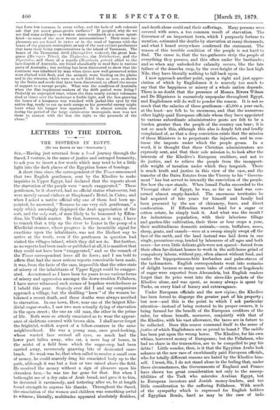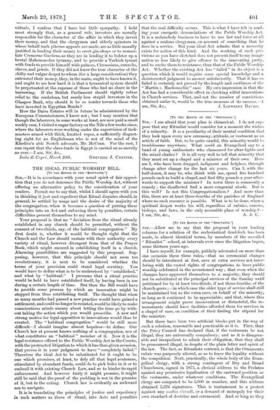LETTERS TO THE EDITOR.
THE DISTRESS IN EGYPT.
(To THE EDITOR OF THE .4 SPECTATOR:I
Sia,—Having just returned from a land journey through the Sased, I venture, in the name of justice and outraged humanity, to ask you to insert a few words which may tend to let a little light into the dark places of the Egyptian house of bondage.
A short time since, the correspondent of the Times announced that two English gentlemen, sent by the Khedive to make inquiries in Upper Egypt, had declared that the reports about the starvation of the people were "much exaggerated." These gentlemen, be it observed, had no official status whatsoever, but were merely casual visitors at Shepheard's Hotel, in Cairo; and when I asked a native official why one of them had been ap- pointed, he answered, "Because he one very rich gentleman," a reply which amusingly displayed the Arab appreciation of the sort, and the only sort, of man likely to be honoured by Effen- diaa, his Turkish master. Be that, however, as it may, I have to remark that a trip up the river to Luxor in the pomp of a Khedivial steamer, whose progress is the invariable signal for exactions upon the inhabitants, was not the likeliest way to arrive at the truth, even if the gentlemen in question had visited the villages inland, which they did not do. But further, as no reports had been made or published at all, it is manifest that they could not have been "exaggerated," and so the remark of the Times correspondent loses all its force ; and I am bold to affirm that had the most serious reports conceivable been made, it was, from the facts of the case, impossible that the utter state of misery of the inhabitants of Upper Egypt could be exagger- ated. Accustomed as I have been for years to see various forms of misery and oppression amongst the down-trodden Fellaheen, I have never witnessed such scenes of hopeless wretchedness as I beheld this year. Scarcely ever did I and my companions approach a village, but the thrilling " keen " of the women be- tokened a recent death, and these deaths were always ascribed to starvation. In one town, How, near one of the largest Hie- divial sugar-works, I saw two men actually dying of starvation in the open street ; the one an old man, the other in the prime of life. Both were so utterly emaciated as to wear the appear- ance of skeletons covered with brown skin. I shall never forget the frightful, wolfish aspect of a fellow-creature in the same neighbourhood. He was a young man, once good-looking, whose wasted face seemed all eyes, so much had the lower part fallen away, who sat, a mere bag of bones, in the midst of a field from which the sugar-crop had been carried away, ravenously gnawing bits of desiccated cane- brash. So weak was he, that when called to receive a small sum of money, he could scarcely drag his emaciated body up to the path, although it was but a foot or two raised above the field. He received the money without a sign of pleasure upon his shrunken face,—he was too far gone for that. But when I bethought me of a dry cake of Arab bread, and gave it to him, he devoured it ravenously, and tottering after us, he at length found strength to express his thanks. Throughout the Saeed, the emaciation of the women and children was something awful to witness, literally, multitudes appeared absolutely fleshless,
and death alone could end their sufferings. Many persons were covered with sores, a too common result of starvation. The Governor of an important town, which I purposely forbear to mention, estimated the deaths by starvation at many thousands, and what I heard everywhere confirmed the statement. The reason of this terrible condition of the people is not hard to find. The cause is, that the tax-gatherers strip the people of everything they possess, and this often under the bastivado ; and so when any unlooked-for calamity occurs, like the late failure of the dourrha crop, by the over-height of the last high Nile, they have literally nothing to fall back upon.
I now approach another point, upon a right and just appre- ciation of which by Englishmen it is scarcely too mach to say that the happiness or misery of a whole nation depends. There is no doubt that the presence of Messrs. Rivers Wilson and De Blignieres is excessively unpopular throughout Egypt, and Englishmen will do well to ponder the reason. It is not BO much that the salaries of these gentlemen-25,000 a year each, at the least—are felt to be enormous, and that the numerous other highly-paid European officials whom they have appointed to various subordinate administrative posts are felt to be a burden greater than the people of the country can bear; it is not so much this, although this also is deeply felt and loudly complained of, as that a deep conviction exists that the mission of these Ministers is to perpetuate the injustice, and to con- tinue the imposts under which the people groan. In a word, it is thought that these Christian administrators are expressly sent, and that their sole mission is, to look after the interests of the Khedive's European creditors, and not to do justice, and to relieve the people from the insupport- able weight of taxation under which they languish. There is much truth and justice in this view of the case, and the transfer of the Daira Estates from the Viceroy to his " Govern- ment " has but served to intensify the conviction of the people. See how the case stands. When Ismail Pasha succeeded to the Viceregal chair of Egypt, he was, so far as land was con- cerned almost empty-handed. The enormous territories he had acquired of late years for himself and family had been procured by the use of chicanery, force, and direct confiscation. If Effendina wanted land for a sugar or cotton estate, he simply took it. And what was the result P An industrious population, with their laborious tillage and garden-like cultivation, their three or four crops a year, their multitudinous domestic animals,—oxen, buffaloes, asses, sheep, goats, and camels—were at a swoop simply swept off the face of the earth, and the land instead was laid down in one single, precarious crop, tended by labourers of all ages and both sexes—for even little delicate girls were not spared—forced from their often far-distant homes to work in the mill-horse grind of compulsory labour, without pay, often almost without food, and under the hippopotamus-hide kurbashes and palm-staves of the taskmasters. English correspondents went into ecstasies of delight because so many more bales of cotton or hogsheads of sugar were exported from Alexandria, but English readers forget that its price went into the sieve-like pockets of the Khedive alone, and was spent, as money always is spent by Turks, on every kind of luxury and extravagance.
Under European officials and the new regime, the Khedive has been forced to disgorge the greater part of his property ; but now—and this is the point to which I ask particular attention—instead of being restored to its proper owners, it is being farmed for the benefit of the European creditors of the ruler, for whose benefit, moreover, conjointly with that of the Khedive, with his vast allowance, the taxes are in future to be collected. Does this course commend itself to the sense of justice of which Englishmen are so proud to boast P The saddle has been put upon the wrong horse. The Khedive, for his own whims, borrowed money of Europeans; but the Fellaheen, who had no share in the transaction, are to be compelled to pay his debts ! Little wonder, then, is it that the Egyptian Arabs look • askance at the new race of exorbitantly paid European officials, who for totally different reasons are hated by the Khedive him- self. I trust, Sir, I do not stand alone in the feeling that, under these circumstances, the Governments of England and France have shown too great consideration not only to the suscep- tibilities of the Turk who misrules Arabian Egypt, but to European investors and Jewish money-lenders, and too little consideration to the suffering Fellaheen. With much of the sympathy which is expressed for English holders of Egyptian Bonds, hard as may be the case of uull-
viduals, I confess that I have but little sympathy. I hold most strongly that, as a general rule, investors are morally responsible for the character of the affair in which they invest their money, and that the clergymen and elderly spinsters in whose behalf such piteous appeals are made, are as little morally justified in lending their money to erect gin-shops or to resusci- tate Cremorne Gardens, as they are in lending it to bolster up a brutal Mahommedan tyranny, and to provide a Turkish tyrant with funds to provide himself with palaces, Circassians, eunuchs, slaves, and jewels. If they did not know the true character of the shifty and vulgar despot to whom (for a large consideration) they entrusted their money, they, in the main, ought to have known it, and ought to see how hard it is that a tyrannical system should be perpetuated at the expense of those who had no share in the borrowing. If the British Parliament should rightly refuse relief to the credulous, but surely less stupid investors in the Glasgow Bank, why should it be so tender towards those who have invested in Egyptian Bonds ?
How the Daira Estates will in future be administered by the European Commissioners, I know not ; but I may mention that though the labourers, in some works at least, are now paid a small weekly sum, I visited a sugar factory on the Nile a few weeks since, where the labourers were working under the supervision of task- masters armed with thick, knotted ropes, a sufficiently disgust- ing sight for an Englishman who is not of the mind of the Khedive's able Scotch advocate, Mr. McCoan. For the rest, I can report that the slave-trade in Egypt is carried on as merrily as ever.—I am, Sir, &c.,



































 Previous page
Previous page